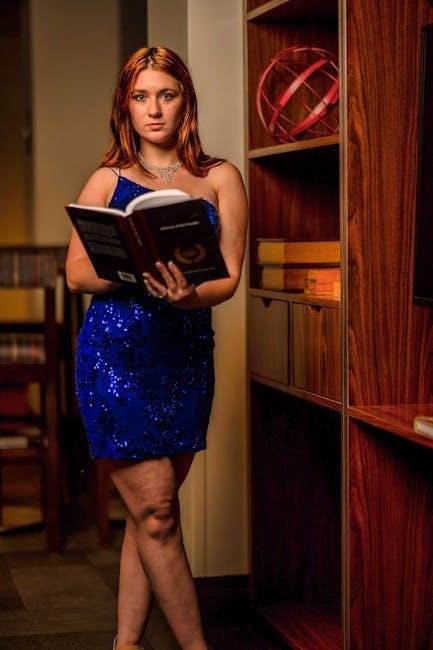Rebecca by Daphne du Maurier: An Article Plan
This article delves into Daphne du Maurier’s masterpiece, “Rebecca,” exploring its multifaceted layers. From the overview of the novel to character analysis and adaptation details, the article provides a comprehensive exploration. The availability of “Rebecca” in PDF format is also addressed, offering readers easy access to this timeless classic and psychological thriller.
Overview of “Rebecca”
“Rebecca,” penned by Daphne du Maurier and first published in 1938, stands as a cornerstone of gothic romance and psychological thrillers. The narrative unfolds through the eyes of an unnamed young woman who, while working as a companion, encounters the enigmatic Maxim de Winter. Their whirlwind romance culminates in marriage, leading her to his imposing estate, Manderley. However, the new Mrs. de Winter finds herself overshadowed by the lingering presence of Rebecca, Maxim’s deceased first wife, whose memory permeates every corner of the mansion.

Du Maurier masterfully crafts an atmosphere of suspense and intrigue, exploring themes of jealousy, identity, and the haunting power of the past. The novel’s enduring appeal lies in its complex characters, atmospheric setting, and exploration of the dark undercurrents beneath a seemingly idyllic facade. The book is available in PDF format for ease of access.
Sally Beauman’s commentary suggests that du Maurier may have based both the narrator and Rebecca on different sides of her personality, as she’s not exactly censuring or endorsing either of them by the end. The story, though narrated by the second Mrs. de Winter, ultimately leaves a lasting impression of Rebecca.
Plot Summary

The story begins in Monte Carlo, where a naive young woman, serving as a companion to the wealthy and unpleasant Mrs. Van Hopper, meets the brooding widower Maxim de Winter. Their unexpected romance leads to a swift marriage, and the young woman finds herself transported to Manderley, Maxim’s grand estate in Cornwall. Upon arriving, she is immediately confronted with the imposing presence of the late Rebecca, Maxim’s first wife, who died in a boating accident.
The new Mrs. de Winter struggles to find her place in Manderley, constantly compared to the seemingly perfect Rebecca by the housekeeper, Mrs. Danvers, who remains fiercely devoted to her former mistress. As the story progresses, the narrator uncovers secrets surrounding Rebecca’s death and the true nature of her marriage to Maxim. The plot thickens with suspicion, deception, and a growing sense of unease, culminating in a shocking revelation about Rebecca’s true character and the events leading to her demise.
Ultimately, the truth emerges, revealing a dark secret that shatters the idyllic image of Rebecca and frees the narrator from her haunting shadow. The story ends with Manderley destroyed, symbolizing the end of the past’s hold on the present.

Main Characters
The Narrator (Mrs. de Winter): Unnamed throughout the novel, she is a young, insecure woman who marries Maxim de Winter. Her innocence and naivety are contrasted with the idealized image of Rebecca. She undergoes a significant transformation, growing from a timid girl to a woman who uncovers the truth and finds her strength.
Maxim de Winter: A wealthy and enigmatic widower haunted by the memory of his deceased wife, Rebecca. He is portrayed as brooding and secretive, carrying a dark secret that burdens him. His relationship with the narrator is complex, marked by both affection and a hidden past;
Rebecca de Winter: Though dead before the story begins, Rebecca’s presence looms large throughout the novel. She is idealized by many at Manderley. As the plot unfolds, her true nature is revealed to be far from perfect.
Mrs. Danvers: The sinister housekeeper of Manderley, fiercely devoted to the memory of Rebecca. She is manipulative and cold, making the narrator’s life miserable and perpetuating the myth of Rebecca’s perfection.
Themes in “Rebecca”
Jealousy and Insecurity: The narrator’s overwhelming jealousy of the idealized Rebecca fuels her insecurities and drives much of the plot. She constantly compares herself to Rebecca, feeling inadequate and unworthy of Maxim’s love. This theme explores the destructive power of envy and the struggle for self-worth.
The Power of the Past: The past, embodied by Rebecca’s lingering presence at Manderley, exerts a powerful influence on the present. The secrets and unresolved issues surrounding her death cast a shadow over the lives of the characters, preventing them from moving forward. The novel explores how the past can haunt and shape the present.
Appearance vs. Reality: Rebecca is presented as the epitome of perfection, but as the story unfolds, her true nature is revealed to be far more complex and flawed. This theme explores the deceptive nature of appearances and the importance of looking beyond the surface to uncover the truth. It highlights the contrast between the idealized image and the reality.
Identity and Transformation: The narrator’s journey is one of self-discovery and transformation. She evolves from a timid, insecure girl into a woman who finds her voice and asserts her identity. The novel explores the challenges of finding oneself in the shadow of another.
Gothic Elements in “Rebecca”
Atmosphere of Mystery and Suspense: “Rebecca” is steeped in an atmosphere of mystery and suspense, creating a sense of unease and foreboding; The secrets surrounding Rebecca’s death and the oppressive atmosphere of Manderley contribute to the overall sense of dread.
The Grand, Decaying Estate: Manderley, the imposing ancestral home of the de Winters, serves as a quintessential Gothic setting. Its grandeur is juxtaposed with a sense of decay and darkness, reflecting the secrets and hidden traumas within its walls. It symbolizes the weight of the past and the family’s troubled history.
Supernatural Elements (Ambiguous): While not explicitly supernatural, “Rebecca” flirts with the possibility of ghostly presence; Rebecca’s lingering influence and the narrator’s vivid dreams create a sense of unease, blurring the line between reality and the supernatural. This ambiguity enhances the Gothic atmosphere.
Damsel in Distress: The unnamed narrator embodies the archetype of the damsel in distress. She is vulnerable, naive, and easily manipulated, finding herself trapped in a web of secrets and deception. Her journey involves overcoming her fears and finding her inner strength to escape her circumstances.
Psychological Thriller Aspects
“Rebecca” masterfully employs elements of a psychological thriller to create a gripping and suspenseful reading experience. The novel delves into the inner workings of its characters’ minds, exploring their hidden motivations, anxieties, and obsessions. This exploration drives the narrative forward, keeping readers on edge.
Unreliable Narrator: The unnamed narrator’s naiveté and insecurity make her an unreliable source of information. Her perceptions are skewed by her own insecurities and the manipulations of those around her. This unreliability creates doubt and uncertainty, forcing readers to question what is real.
Mind Games and Manipulation: The characters in “Rebecca” engage in subtle but powerful mind games. Mrs. Danvers, in particular, uses psychological manipulation to torment the narrator, creating a sense of paranoia and isolation. These power dynamics contribute to the overall sense of unease.
Secrets and Deception: The novel is built upon a foundation of secrets and deception. The truth about Rebecca’s death and the de Winters’ past is slowly revealed, keeping readers guessing until the very end. This gradual unveiling of secrets fuels the suspense and keeps the plot moving.
Daphne du Maurier’s Writing Style
Daphne du Maurier’s writing style in “Rebecca” is characterized by its evocative descriptions, suspenseful pacing, and exploration of complex psychological themes. Her prose is both elegant and accessible, drawing readers into the world of Manderley and its inhabitants. Du Maurier masterfully crafts a sense of atmosphere, using vivid imagery to create a haunting and unforgettable setting.
Atmospheric Setting: Manderley, the grand estate, becomes a character in itself, influencing the mood and tone of the novel. Du Maurier’s detailed descriptions of the house and its surroundings create a sense of both beauty and decay, reflecting the inner turmoil of the characters.
Suspenseful Pacing: Du Maurier skillfully builds suspense throughout the novel, gradually revealing secrets and creating a sense of unease. The pacing keeps readers engaged and eager to uncover the truth behind Rebecca’s death and the mysteries of Manderley.
Psychological Depth: Du Maurier explores the inner lives of her characters with remarkable depth and insight. She delves into their motivations, fears, and desires, creating complex and believable individuals. This psychological depth adds layers of meaning to the story.
Literary Significance and Impact
“Rebecca” holds significant literary importance as a modern gothic novel that redefined the genre. Daphne du Maurier’s work is celebrated for its exploration of psychological themes, suspenseful narrative, and memorable characters, influencing countless writers and readers. The novel’s impact extends beyond literature, inspiring film adaptations and shaping popular culture.
Genre Innovation: “Rebecca” blended gothic elements with psychological suspense, creating a unique and compelling narrative. It influenced the development of the modern gothic genre and paved the way for other authors to explore similar themes and styles.
Enduring Popularity: The novel has remained a bestseller since its publication in 1938, captivating generations of readers. Its themes of love, jealousy, and identity continue to resonate with audiences, ensuring its place as a literary classic.
Cultural Influence: “Rebecca” has had a lasting impact on popular culture, inspiring numerous adaptations and references in film, television, and other media. Its characters and plot have become iconic, shaping our understanding of gothic romance and suspenseful storytelling.
Adaptations of “Rebecca” (Film, TV, etc.)
“Rebecca” has been adapted into various forms, including film, television, and stage productions, each offering a unique interpretation of Daphne du Maurier’s classic novel. These adaptations have contributed to the story’s enduring popularity and have introduced it to new audiences.

Alfred Hitchcock’s Film (1940): The most famous adaptation is Alfred Hitchcock’s 1940 film, which won the Academy Award for Best Picture. Starring Laurence Olivier and Joan Fontaine, the film is a faithful adaptation that captures the novel’s suspenseful atmosphere and psychological complexity. It is considered a cinematic masterpiece and remains a classic of the gothic thriller genre.
Other Adaptations: In addition to Hitchcock’s film, “Rebecca” has been adapted for television multiple times, as well as for the stage. These adaptations offer different interpretations of the story, with varying degrees of fidelity to the novel. Each adaptation brings its own unique style and perspective to the story, exploring its themes and characters in new ways.
Impact of Adaptations: The adaptations of “Rebecca” have played a significant role in popularizing the novel and introducing it to wider audiences. They have also contributed to the story’s cultural impact, shaping our understanding of its themes and characters.
Availability of “Rebecca” in PDF format
Daphne du Maurier’s “Rebecca” is widely available in PDF format, making it easily accessible to readers who prefer digital versions of books. This accessibility has contributed to the novel’s continued popularity and has allowed new generations of readers to discover its timeless story.
Online Retailers: Numerous online retailers, such as Amazon, Barnes & Noble, and Kobo, offer “Rebecca” as a PDF ebook. These retailers often provide free samples, allowing readers to preview the book before purchasing it. Additionally, they may offer special deals or discounts on the ebook version.
Online Libraries: Many online libraries, such as Project Gutenberg and Internet Archive, offer free PDF versions of “Rebecca” because the book is in the public domain in some regions. These libraries provide a valuable resource for readers who want to access the book without cost.
Other Websites: Various other websites also offer “Rebecca” in PDF format, although it is important to ensure that these websites are reputable and that the PDF files are safe to download. Some websites may offer unauthorized copies of the book, which may violate copyright laws.
Benefits of PDF format: The PDF format offers several advantages for readers. It allows for easy reading on various devices, including computers, tablets, and smartphones. It also preserves the original formatting of the book, ensuring a consistent reading experience.
Analysis of Rebecca and the Narrator
Daphne du Maurier’s “Rebecca” intricately weaves a narrative where the deceased Rebecca de Winter dominates the lives of those left behind, particularly the unnamed narrator, the second Mrs. de Winter. Rebecca, though absent, is a powerful force, an idealized memory that casts a long shadow, influencing every aspect of Manderley and its inhabitants.
The narrator, in stark contrast, is initially presented as an insecure and naive young woman. Her youth and inexperience make her a blank canvas upon which the imposing figure of Rebecca is projected. She struggles with feelings of inadequacy, constantly comparing herself to the seemingly perfect Rebecca, whose beauty, charm, and social grace are legendary.
The novel explores the psychological impact of Rebecca’s lingering presence on the narrator’s sense of self. The narrator’s journey is one of self-discovery, as she gradually confronts the idealized image of Rebecca and uncovers the truth about her predecessor’s life. This process of revelation allows the narrator to assert her own identity and break free from Rebecca’s dominating influence.
Du Maurier masterfully crafts these two characters, using Rebecca as a symbol of the past and the narrator as a symbol of the present, locked in a battle for dominance within the confines of Manderley.
